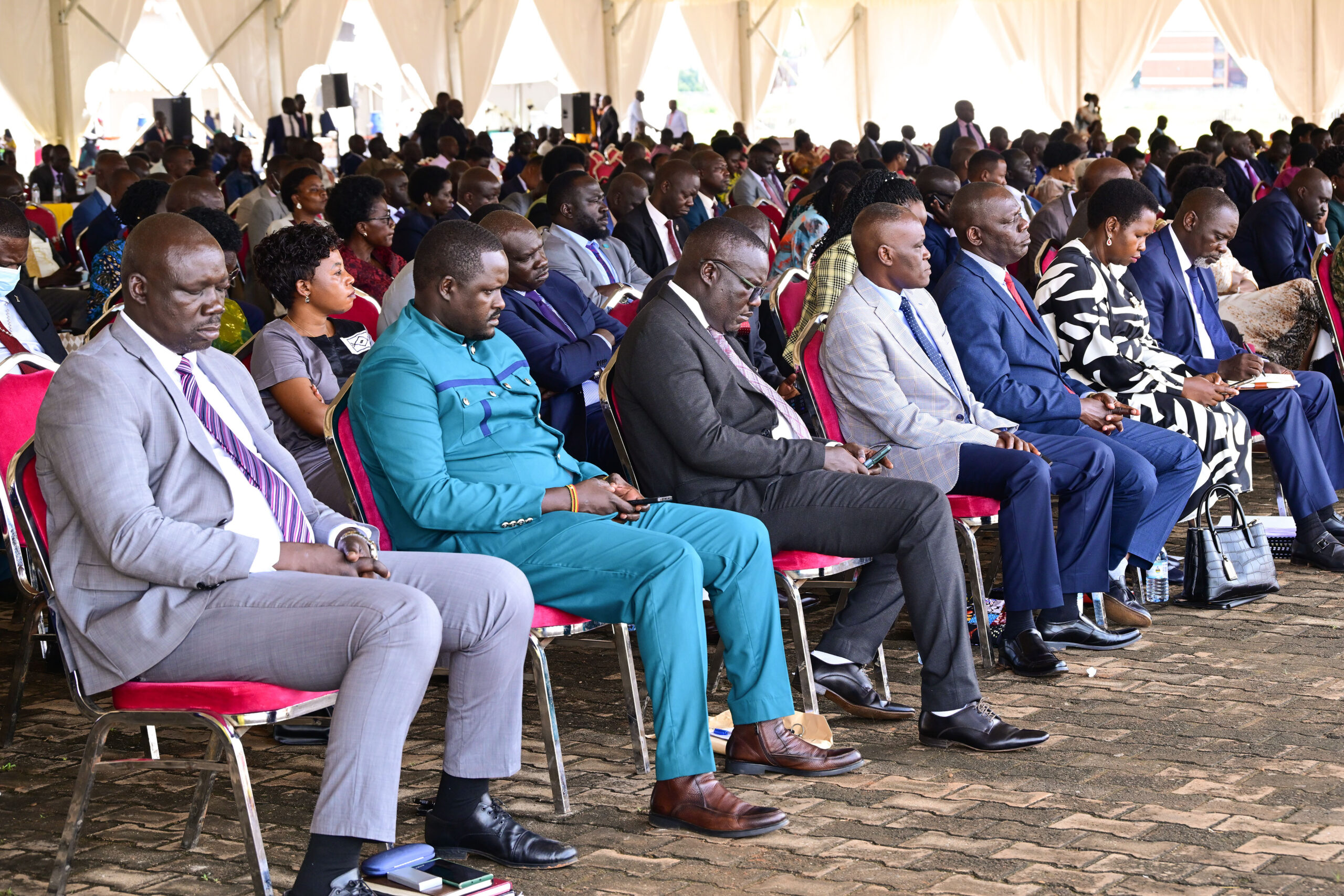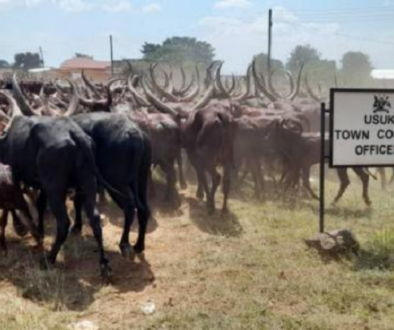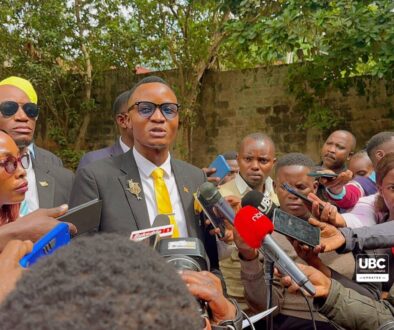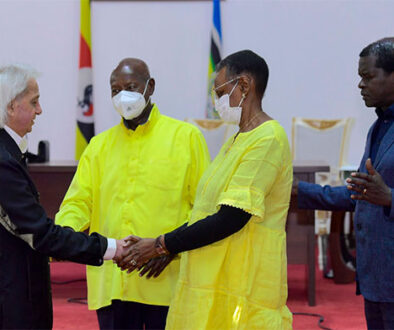Museveni addresses legislators

Our reporter
GULU – President Yoweri Kaguta Museveni has implored the Members of Parliament to mobilize Ugandans to take part in wealth creation initiatives in order to stabilise their homestead income.
“I have been telling you since the 1960s that whatever you do if you want people to develop, start with the homestead incomes because now you are talking about the roads and others, there are places where the roads are good. The road from Gulu to Kampala is good, what are you selling along that road?” he inquired.
The President made the remarks Thursday while addressing Members of Parliament during a parliamentary regional sitting at Kaunda Grounds, Gulu City.
President Museveni informed the legislators that they should sensitise the people they lead to embracing the four-acre model, saying that this type of farming can help Ugandans to create wealth and jobs.
“In 2018, I made a countrywide tour, zone by zone and I gave you this booklet where I talked about the four sectors and the seven ways of wealth and job creation. In this booklet, I made it clear that the 4-acre model was a rescue operation for the parts of the country that had already fragmented land. That is why I said that since you have very few acres, make sure that the quot;ekibaro" (calculation) is correct,” he noted.
“That is why I said that for the four acres or less, seven activities should be conducted which include coffee-one acre, fruits-one acre, pasture for dairy one -acre, and another acre for food crops. In the backyard, you put poultry for eggs and piggery, then if you are near a wetland do fish farming. If you do that, you get millions of shillings even if you do it on a small scale. In this booklet, I called it intensive agriculture with high-value enterprises. But even if you have more, there's no harm, instead of having one acre of coffee, have four.”
President Museveni also explained that for the people who have large chunks of land, should undertake extensive agriculture to make money.
Furthermore, President Museveni informed the MPs that he recently ordered the removal of the 18 percent tax on locally produced starch and also ordered the imposition of a high import duty tax on imported starch.
The President also called on the MPs and other politicians to support his position on free education in government schools.
“Push for free education in government schools but other people are pushing for charges. Many children are street children because they didn’t go to school because of charges. So, the political class and all the elite, please if you say you care about your people, support my position on free education in government schools. If you don’t want to support it, then keep quiet and let the children suffer, don't just talk,” he said.
On the other hand, President Museveni thanked the MPs for passing a motion recognizing the work of the Uganda People’s Defence Forces (UPDF) and the NRM government in pacifying Northern Uganda and the whole country.
According to the President, the UPDF has been able to succeed in its operations because of ideology, discipline, and effective planning.
“The insecurity of Karamoja is not new at all, it was there even in colonial times, it only got worse after 1979 when the Matheniko, one of the tribes of Karamoja, looted the arms in Moroto barracks when the
Amin’s soldiers had run away. Uganda was number four in exporting refugees, it was competing with Ethiopia, Afghanistan and I think Sudan.
And what had the West Nilers run away from? From ideological bankruptcy because remember, I was part of fighting Idi Amin, nobody can say they fought Idi Amin more than I did but as we were fighting Idi Amin, we always told our people that look here, don’t blame the mistakes of Idi Amin on all the West Nilers because all these things that Amin is doing, he doesn’t consult the people in West Nile,” he said.
“Even when we were fighting UPC, it was the same, we told our cadres, don’t blame the people of Northern Uganda for the mistakes of Obote.
Distinguish between the misleaders and the misled, this is the line of the NRM. Always make a distinction between the misleaders who are few and the misled who are many. In most cases, the masses are not involved at all, it is just a small group of people.”
The Speaker of Parliament, Rt. Hon. Anita Among informed the President that the sitting is covering the issues, challenges, and opportunities that are from West Nile, Acholi, Lango, and Karamoja.
“Your Excellency the sitting of parliament in Gulu, Northern region is a milestone in the legislative history of Uganda as it is the first of its kind that we are having at the regional level. The 11th parliament appreciates your immense support for the decision to take the parliament to the people at the regional sitting,” she said.
“Your Excellency, the embracement of regional sitting is under the legislative vision of a transformed, independent, and people-centered parliament. Your Excellency sir, contrary to what critics are raising that the regional sittings of parliament are costing us a lot, that is not true, the
Parliament sitting is legally and procedurally grounded in Article 95 (2) of the constitution of the Republic of Uganda 1995 and rule 17 of the rules of procedure of parliament which empowers the Speaker to convene parliament at such a place and time through a proclamation.”
Rt. Hon. Among added that the regional sittings will exhaustively deliberate upon the most urgent matters that are intricate to the growth and development of a particular host area.
During the same sitting, Parliament paid tribute to President Museveni for the visionary Leadership that has enabled the Uganda People’s Defense Forces to safeguard the peace and security in Acholi, Lango, West Nile, and Karamoja.
The Kazo county MP, Hon. Dan Kimosho while presenting the motion cited that the Lord’s Resistance Army (LRA) conflict in the Northern Region between 1986 -2007 occasioned a humanitarian crisis, and widespread human rights violations, such as the death of thousands of civilians, abductions of children, rape, mutilations, displacement of civilians, torture, slavery, use of children soldiers and mass destruction of property but the UPDF, through the visionary leadership of President Museveni was able to end the conflict.


